Hobby guide for metal detectorists & Treasure hunters
Searching for historical objects with a metalldetektoren is one of the most fascinating activities. In recent years, the hobby has attracted more and more people interested in history and archaeology. The often lengthy research into historical facts, the search in often charming landscapes, the exercise in the fresh air and the great outdoors and finally the exciting recovery of coins and objects that provide direct contact with the past and history of our people are impressions that remain unforgettable.
Who hasn't dreamed of going on a treasure hunt?
Full of enthusiasm, we see on television how valuable treasures are discovered all over the world. Disappeared war chests, family treasures, offerings to the gods etc. etc. - The imagination knows no bounds here. Impossible, there is no such thing here ?!

Beach finds

Roman hoard find
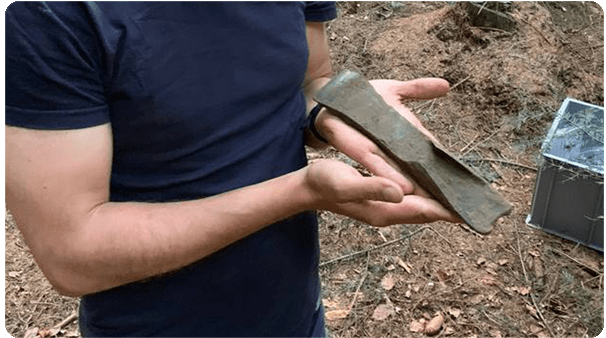
Bronze Age flap axe
A large part has never been dug up again, whether because our parents and ancestors were captured, murdered or died in the chaos of war. Discovering all these small and large treasures is not only historically meaningful and important but also an adventure that will inspire you. Adventure - treasure hunt!
What do I want to find and where can I find it?
This consideration should be at the forefront of your treasure hunt. Whether you are looking for euro coins, militaria or medieval coins, you will find what you are looking for in Germany! And for sure! I can't do the information gathering and research for you. I would just like to list some of the possible search sites here, please observe the ethical behavior and legal regulations that apply to all those interested in history. (see also code of honor)

Fields are the main place to search for the vast majority of all explorers! After good research, anything can be found here. Finds from deserted places of all times, militaria, modern times etc. etc. Digging is easy and the range of finds is widest here, you will find the most here.
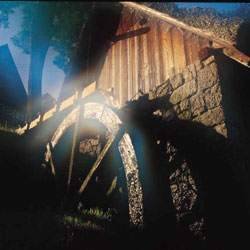
The millers of the past were generally respected and wealthy contemporaries. There was delivery traffic at mills, everything had to be unloaded by hand, so you can imagine that there is an increased find rate for old coins in these places.

Conspicuous large trees at clearings or roadsides often served as meeting points, markers and resting places.

Hills in valley entrances and exits / viewpoints: Watchtowers often existed at these points in order to recognize approaching dangers more quickly. In combination with other watchtowers within sight, these also often served as a communication network, i.e. as a kind of "early warning system".

Romans used to throw coins with good wishes into the water when crossing bridges. At fords along historical paths, horses were watered and people rested.

Wells and jetties are always good places to search with salvage magnets. Weapons, ammunition, DM coins, imperial coins (nickel), old agricultural equipment etc. are often found in wells. Tools, fishing hooks, engine parts and even complete outboard motors can be found on boat moorings.

The surroundings of castles are particularly interesting outside the ramparts. Typical finds from the castle search include coins, crossbow bolts, weapons and associated parts, horse harnesses, rings, keys, locks, belt buckles, etc. Cutlery, coins and jewelry are increasingly found underneath the former lavatories and at kitchen windows.Searching here is subject to authorization!
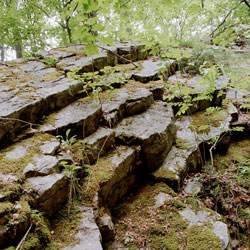
Rocks, rock formations and especially solitary menhirs are frequent places of worship and sacrifice, meeting places and can even be ancient observatories. The full spectrum of finds can be found here, and there is an increased probability of early historical finds.

If the owner agrees, the floor should be prospected during a renovation. Old half-timbered houses were often rebuilt. Old vaulted cellars and wine cellars are very interesting, and the walls should also be scanned with a detector.
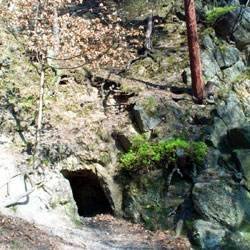
Even in ancient times, caves offered protection from the weather and served as a place of residence, sacrifice, burial and treasure. The search in caves is very promising! The deepest, lowest corners and rock wall slits deserve a closer look. Caution! Never enter caves between October and April, many caves are hibernating places for bats, if they are disturbed they will die miserably! Help to protect these wonderful and rare animals! Also observe the necessary safety measures. There are many good cave guides available in bookshops.
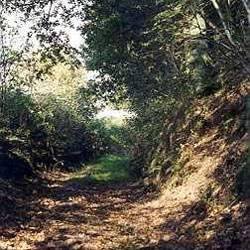
Germany is covered in old hollow ways, paths that were used a long time ago and later fell into disuse. These paths were once very busy. Over the course of many years, the water deepened the hollows, so that today we can see deeply cut paths. A search along these paths reveals a wide range of finds that may date back to the Bronze Age.

Many springs and moors were already sacred to the Germanic tribes and sacrifices were made to the gods at these sites for a variety of reasons that are assumed today. Even human sacrifices were made at the springs until the early Middle Ages. Only in the course of Christianization were these barbaric rituals banned and made punishable.
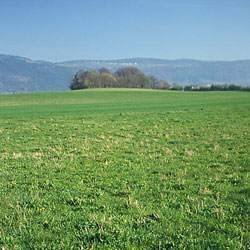
Battlefields have existed in Europe for more than 2500 years, and anyone who discovers a Roman battlefield is very lucky. However, it is mostly those from the 1st and 2nd World Wars that are found. On these sites you will find a variety of militaria, coins, weapons of all kinds, badges, identification marks, emblems, buttons and unfortunately also dangerous ammunition from the First and Second World Wars. If you can't stop looking there, you should dig with increased caution!
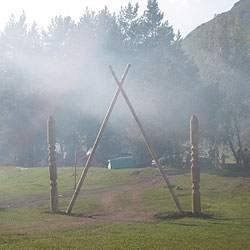
Probability of finding 100%, modern coins are also guaranteed here. However, a lot of patience is required for the extreme scrapping of such places.

Probability of finding 100% here too. Coins and jewelry are guaranteed. Hard-working searchers have often financed their vacation with them. Finds of old coins or other valuable metal objects washed up on the beach cannot be ruled out.
The list of interesting search sites could be continued, but would go beyond the scope of information here. Fancy a treasure hunt? Then contact us and become a successful prospector and treasure hunter yourself!
Order & advice: 0173 8707075
Mon.- Fri.: 9:00 - 16.00 o'clock


